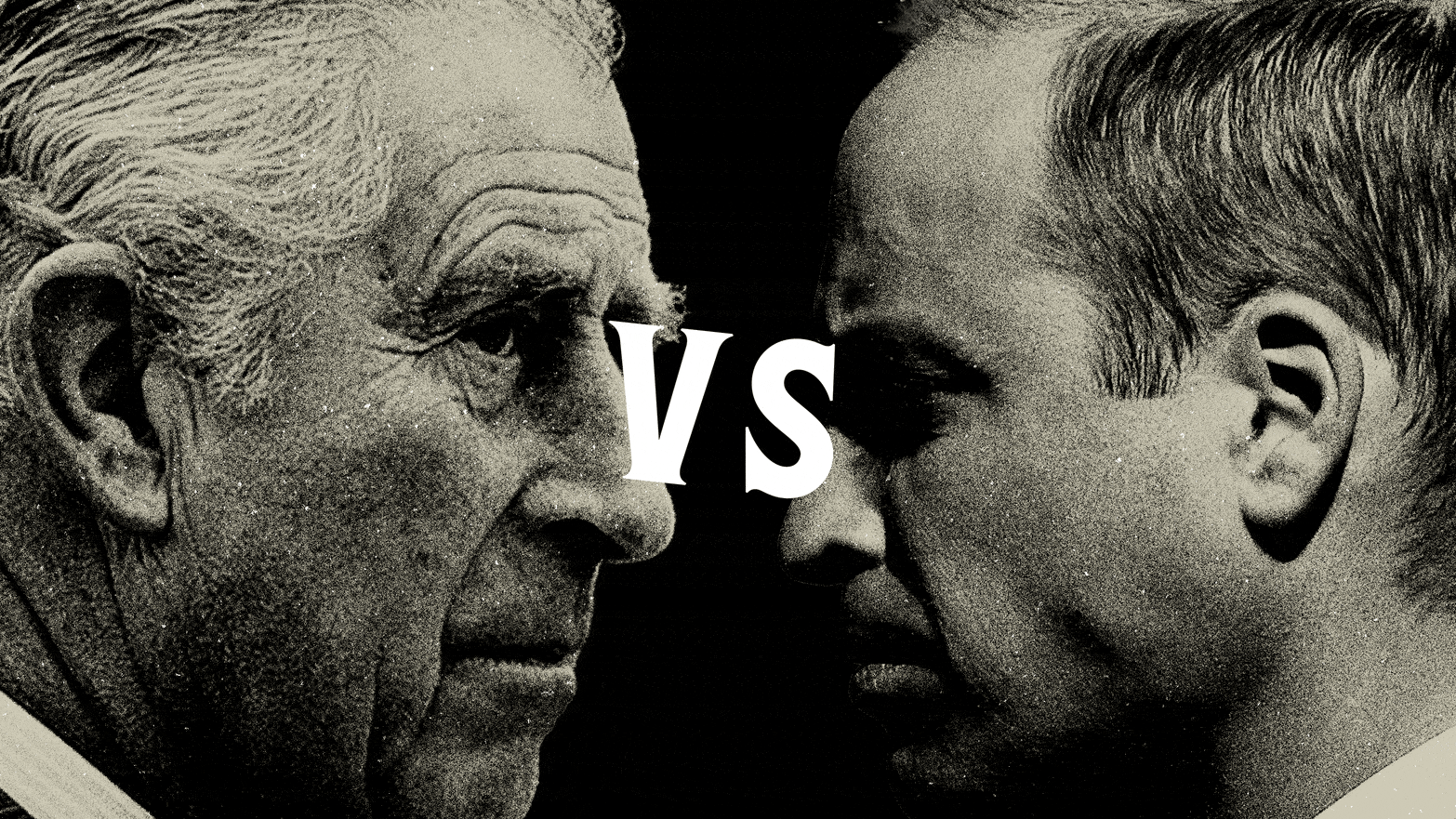If you love The Daily Beast’s royal coverage, then we hope you’ll enjoy The Royalist, a members-only series for Beast Inside. Become a member to get it in your inbox on Sunday.
One thing that Prince Charles hates, as his first wife discovered, is being overshadowed by someone less important than him.
So if Charles were to sit down with a cup of tea to watch the replay of the State Opening of Parliament on Tuesday, he would no doubt note with approval the attention of the cameras was firmly on him, as he delivered a more than creditable try-out for his upcoming role as king, dressed in full military regalia.
To the left of King Charles III, as we shall one day call him, his wife Camilla also attracted some comment, but there was precious little attention paid to the other royal in attendance, Prince William, who was very deliberately dressed down to the point of invisibility. Seated on a lowly chair compared to his father’s magisterial throne, his dark suit enabled William to effectively disappear into the background for his father’s day in the sun.
Charles couldn’t have wished his son to be more helpful and supportive.
One of the interesting by-products of the acrimonious departure of Prince Harry and Meghan Markle from the British royal family has been that, as the emotional distance between Harry and Charles has grown, the space between Charles and William has commensurately shrunk.
Given how closely Charles and William’s interests are now aligned, representing a 1-2 sequence for the top job, it is perhaps not entirely surprising that the multiple crises of the past two years, which are, whisper it, starting to disappear into the rear view mirror, have brought them closer together.
But still, it is no secret in royal circles that they had an extremely difficult relationship when William was a teenager, strained almost to breaking point by the fallout from the implosion of his parents’ marriage and his mother’s subsequent death. William took Diana’s side and the hurt and resentment persisted well into William’s twenties, aggravated when William realized that Charles had used the boys’ troubles to burnish his own reputation, egged on by his chief adviser Mark Bolland.
In fact, Charles’ relationship with Harry was actually understood by most friends of the family to be warmer than his relationship with William when the boys were teenagers and young men (which is part of what has made Harry’s attacks of the past two years particularly horrible for Charles). Some have speculated this is because William saw more and understood more of the breakdown of his parents’ relationship. Harry was just 11 but William was already 13½ and in his first term at Eton when Diana gave her famous interview to Panorama, for example.
William took on an almost adult role in those years, trying to comfort and advise his mother; he is understood to have met Martin Bashir, and to have counseled Diana against doing the interview that would finally blow up the Windsor marriage.
The writer Christopher Andersen, whose best selling book Diana’s Boys examined Harry and William’s childhoods in detail, told The Daily Beast: “By the time he was 9, William was completely shell-shocked by his parents’ open marital warfare and his first impulse was to comfort Diana. His mother would flee to the bathroom in tears, and it was William who famously slipped tissues under the door as he pleaded with her not to cry. At the time, William blamed Charles for making his mother miserable, and he often lashed out at his father in anger. More than once he was seen clenching his fists at Charles and shouting ‘I hate you Papa! I hate you!’”
William was 15 when his mother died, and unsurprisingly wasn’t thrilled about his father’s ramping up of his relationship with Camilla which had been blamed, by Diana, for the breakup. He and Harry attended the 2005 wedding but there have always been rumors that they were persuaded to do so by their father’s staff.
If William had his reservations about his father, the feeling was mutual; Charles, a source tells The Daily Beast, was regularly dismayed by William’s emotional style, and what he felt was an overdoing of the common touch after he married Kate Middleton.
“Charles hated William’s ‘I’m in touch with my feelings’ schtick,’” a friend of the family tells The Daily Beast. “He felt it wasn’t regal. It annoyed him with both sons, but particularly William because he didn’t feel the future king had to be touchy-feely, and it irritated him that William didn’t seem willing to take that on board.
“Charles’ style is very different; buttoned up, reserved and he hated the emoting, the interviews about his mental health and his feelings.”
But William, girded up by Kate, has absolutely refused to be pushed around. As Andersen says: “William is incredibly headstrong, and has had many rows with his father over the years about what royal duties he was or wasn’t willing to perform.”
William’s emotional and accessible side was on display again as recently as Thursday when he hugged a 66-year-old man during a walkabout in Scotland. William has insisted on doing things his own way—and annoying as it may be for Charles, the people appear to love him for it. To be fair, Charles (encouraged by Camilla) has sought to tone down the pomposity in recent years but when polls on the matter are taken, about half of respondents still say they want the crown to skip a generation, miss Charles and go direct to William, a prospect which, to be fair, William would never even entertain.
Charles must expect, however, that for his detractors, especially the hardcore stans of Diana’s ghost, he will never be anything other than an impostor who has usurped his son’s rightful place.
He clearly never expected the way he treated and cheated on Diana—who was 20 years old to his 32 when they married—to become public property, but between Andrew Morton and The Crown, it has. The accepted narrative is that he behaved abominably. There are any number of anecdotes on the public record to back this up, from the tampon tape (recorded in 1989 and published in 1993) to the gift of jewelry for Camilla, engraved with their pet names, that Diana found the day before her wedding on his desk.
The truth is that had William wanted for one moment to be the next king (as his mother hoped), to weaponize the toxic past of his father would have been the work of an instant. But William has no such Game of Thrones-like urges. He and Kate are quite happy being the warm-up guys for the next few decades. William will always have a significant hold over his father, though, and the relationship between Charles and William, while not one of equals, will be significantly more even handed than that between the queen and Charles.
Elizabeth has been queen since Charles was 4 years old, and for all of her reign, bar perhaps the last decade, he has been very much the lowly cadet. William is more likely to get something closer to partner status, largely because Charles needs him on side.
Charles received a monstering from the press and the public in 2017 when the 20th anniversary of Diana’s death was marked with a deluge of official and unofficial TV programs and documentaries.
William and Harry gave multiple interviews but notably declined to praise, or even exonerate their father. Instead, they said almost nothing about him at all.
It was a loud enough silence that people noticed. The closest that William got was when he told the makers of the BBC programme: Diana, 7 Days “My grandmother wanted to protect her two grandsons, and my father as well. Our grandmother deliberately removed the newspapers, and things like that, so there was nothing in the house at all. So we didn’t know what was going on.”
Harry, notably, was more effusive, saying in the same documentary: “One of the hardest things for a parent to have to do is tell your children that your other parent has died. How you deal with that, I don’t know. But he was there for us. He was the one out of two left. And he tried to do his best and to make sure that we were protected and looked after. But he was going through the same grieving process as well.”
That was generous of Harry. Later, he would come to retract his warm view of his father, and accuse him of ignoring his calls and cutting him off financially, as viewers of Oprah will know.
Charles didn’t complain privately or publicly, of course, although he was widely thought to be hurt. He took an extended break from the public eye in the run-up to and days around the anniversary at his estates in Scotland, confident that, in the end, like every other royal difficulty, it would blow over.
Things between William and Charles might have ticked along in this rather lukewarm fashion had it not been for the Harry and Meghan bombshell that struck the family in 2020.
It changed everything, forcing father and son to finally fully commit to working together. There seems no reason to disbelieve reports that William was instrumental in the defenestration of Prince Andrew from royal life, another moment of unity.
But ultimately, it was Harry who pushed William into Charles’ arms with his inflammatory comments to Oprah, including the jibe that he pitied his brother and father because they were “trapped” in their royal lives.
“Harry forced William to jump, and when the moment came there was no doubt for William which way to go,” says the friend. “William picked the monarchy, and that has meant working closely with Charles. The relationship is as good as it’s ever been in his adult life.”
Clarence House and Kensington Palace did not return emails seeking comment on the nature and strength of William and Charles’ relationship.

